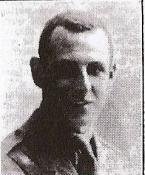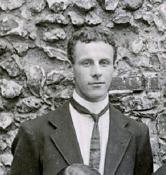
|
The King's School Canterbury |
Roll of Honour |
| Lieutenant George Henry Waldron GOUGH | |
|
1/7th Battalion Cheshire Regiment Date of birth: 16th August 1894 Date of death: 15th December 1917 Killed in action aged 23 Buried at Jerusalem War Cemetery Row R Grave 48 |

|
| He was born at "Grove Mount", Barnton in Northwich on the 16th of August 1894 the eldest son of Dr Henry Edward Gough MRCS LRCP the medical officer for health in Northwich Rural and Urban districts and Frieda Magdalena (nee Gotz) of Highfield House Northwich in Cheshire. He was christened at Barnton, Cheshire on the 7th of September 1894. He was educated at Elstree Preparatory School and at the King's School Canterbury from January 1909 to December 1912 where he served as a Lance Corporal in the Officer Training Corps. In 1913, having passed the London matriculation, he studied medicine at Owens College, Victoria University of Manchester. Following the outbreak of war he enlisted at Manchester as Private PS4874 in the 20th (Service) Battalion Royal Fusiliers, (City of London Regiment), University and Public School Battalion on the 5th of September 1914. At a medical examination, which took place on the same day, it was recorded that he was five feet nine and quarter inches tall and that he weighed 120lbs. It was also noted that he had a dark complexion, grey eyes and brown hair. He was promoted to Corporal on the 18th of September 1914 and served at Epsom, Macclesfield and at Clipstone Camp, Nottingham. He applied for a commission on the 10th of July 1915 and was commissioned as a 2nd Lieutenant in the 3/7th Battalion Cheshire Regiment on the 19th of August 1915. He embarked for overseas service on board the SS 'Olympic' on the 3rd of January 1916, arriving in Egypt on the 15th of January. He reported for service to the 1/7th Battalion of his regiment at Wadi-en-Natrun on the 4th of February 1916. He was promoted to Lieutenant on the 1st of July 1917 and was posted to 21st Signals for a signalling course at Zeitoun on the 24th of August 1917, which he passed. He saw action at Gaza in Palestine in November 1917 being involved in the capture of Jerusalem on the 9th of December. On the 14th of December the battalion, which had been guarding Jerusalem, advanced through the line held by the 5th Battalion Welch Regiment and seized a ridge in the face of heavy enemy fire. The following day, whilst holding a forward observation post on a hill four miles to the north east of Jerusalem, George Gough was shot and killed by a bullet. His Commanding Officer wrote:- "He was struck by a bullet right over the heart when leading a patrol round an exposed hill which it was absolutely necessary to hold. His platoon did splendidly. He was one of the best, as reliable as a rock and as steady.... I had had hopes of his coming on the Battalion Headquarters Staff.....so you see I have lost a friend and the battalion one of its most precious officers. One could not help forming an extremely high opinion of his integrity and worth, fearless to a degree, as bold as a lion, he went about giving orders and it was position saved." A brother officer wrote: - "Gough was such an awfully nice chap... a perfect gentle knight if ever there had been one in this war." His Captain wrote:- "One could not help forming an extremely high opinion of his integrity and worth; fearless to a degree, as bold as a lion, he went about giving orders, and it was greatly due to his coolness and example that the attack was frustrated and the position saved. Two days previously he and myself took Holy Communion in the Chapel attached to the Convent where we were billeted." Another brother officer, an OKS, wrote:- "I knew him very well as we came out together on the "Olympic" and had been in the same company for some time and were together during most of this last advance. I do not think I have met anyone I thought more of. He was very quiet, and yet if there was anything to be done he was always ready for it, and I do not think he knew what it was to be afraid. I think he had very high ideals, which he did not talk about but succeeded in realizing more than is given to most. I had arranged to meet him in Canterbury again after the war. But I have never had the slightest doubt that all this is for a very short time and that we will all meet again in a life happier than this and more so than we can realize. And, after all, no one could possibly have done better." One of the men from his platoon wrote:- "I who had been his servant for close on two years was greatly attached to him. Any command of his was a pleasure for me to obey, as he was a great friend to me, also a perfect gentleman. It may be a little consoling to you to know he is in a decent burial ground near the wall of the Holy City; it is a beautiful place; he did duty quite close to the place a few days before he met his death. He was on duty at Jaffa Gate on the event of General Allenby entering that city. I dare not give you the details as to where your son met his death, but this I can tell you, that he suffered no pain, he passed away in a few seconds with a smile on his face without speaking a word. His platoon also that of his brother officers, made a name for themselves. The officer with him at the time has been decorated, also I believe your son had he lived to receive it." He was mentioned in General Sir Edmund Allenby's despatch of the 3rd of April 1918 for "gallant distinguished service in the field." His younger brother, 2nd Lieutenant John Noel Leigh Gough, (OKS) Royal Artillery, was killed in action on the 8th of March 1918. Their father instituted the Gough Photographic Prizes at the school in their memory. There is a memorial plaque to the Gough brothers in the parish church, Northwich. |
|
 | |
Back